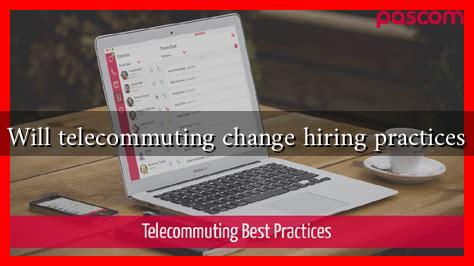-
Table of Contents
Will Telecommuting Change Hiring Practices?
The rise of telecommuting has transformed the landscape of work, especially in the wake of the COVID-19 pandemic. As companies adapt to remote work, hiring practices are also evolving. This article explores how telecommuting is reshaping recruitment strategies, the implications for employers and job seekers, and what the future may hold.
The Shift to Remote Work
Telecommuting has gained significant traction over the past few years. According to a report by FlexJobs, remote work has increased by 159% since 2005, with a notable spike during the pandemic. This shift has prompted organizations to rethink their hiring practices in several ways:
- Wider Talent Pool: Companies are no longer limited to local candidates. They can now hire talent from anywhere in the world, increasing diversity and expertise.
- Flexible Work Arrangements: Employers are offering more flexible schedules, which can attract a broader range of applicants, including those with caregiving responsibilities or other commitments.
- Cost Considerations: Remote work can reduce overhead costs for companies, allowing them to invest more in talent acquisition and employee benefits.
Changing Recruitment Strategies
As telecommuting becomes more prevalent, recruitment strategies are adapting to meet the needs of a remote workforce. Here are some key changes:
- Virtual Interviews: The traditional in-person interview is being replaced by video calls. This not only saves time but also allows for a more flexible interview process.
- Skills-Based Assessments: Employers are increasingly focusing on skills rather than traditional qualifications. This shift allows them to identify candidates who can perform well in a remote environment.
- Emphasis on Soft Skills: Communication, adaptability, and self-motivation are crucial for remote work. Hiring practices are now placing greater emphasis on these soft skills during the selection process.
Case Studies: Companies Leading the Way
Several companies have successfully adapted their hiring practices to accommodate telecommuting:
- GitLab: As a fully remote company, GitLab has developed a comprehensive hiring process that includes asynchronous interviews and a focus on cultural fit. Their approach has allowed them to attract top talent globally.
- Zapier: This automation tool company has embraced remote work since its inception. Zapier’s hiring process emphasizes transparency and inclusivity, ensuring that candidates from diverse backgrounds feel welcome.
- Shopify: After announcing a permanent shift to remote work, Shopify revamped its hiring practices to prioritize candidates who thrive in a remote environment, focusing on results rather than hours worked.
Challenges and Considerations
While telecommuting offers numerous benefits, it also presents challenges for hiring practices:
- Assessing Cultural Fit: Evaluating whether a candidate will fit into a company’s culture can be more challenging in a remote setting.
- Onboarding New Employees: Remote onboarding requires a different approach to ensure new hires feel integrated and supported.
- Maintaining Engagement: Companies must find ways to keep remote employees engaged and connected, which can influence hiring decisions.
The Future of Hiring in a Remote World
As telecommuting continues to evolve, hiring practices will likely undergo further changes. Companies may adopt more advanced technologies, such as AI-driven recruitment tools, to streamline the hiring process. Additionally, the focus on remote work may lead to a shift in employee expectations, with candidates seeking more flexibility and work-life balance.
Conclusion
Telecommuting is undeniably changing hiring practices, offering both opportunities and challenges for employers and job seekers alike. As organizations adapt to a more remote workforce, they must rethink their recruitment strategies to attract and retain top talent. By embracing these changes, companies can not only enhance their hiring processes but also create a more inclusive and diverse workplace. The future of work is here, and it is remote.
For more insights on remote work and hiring practices, you can visit FlexJobs.

